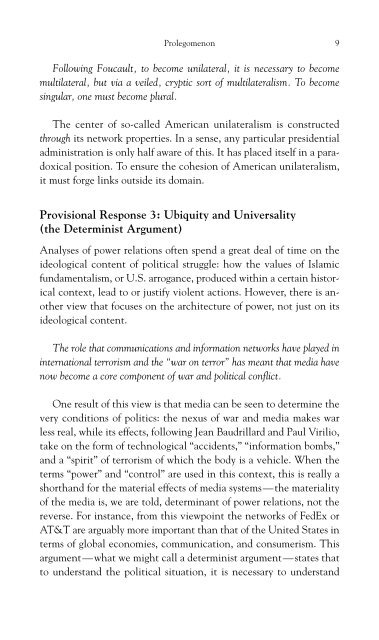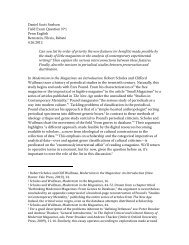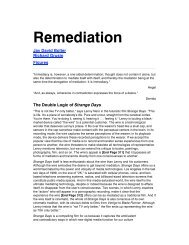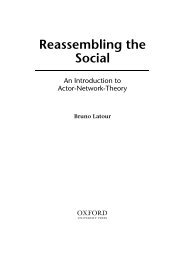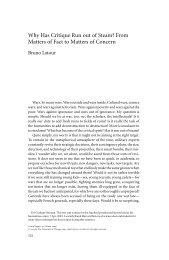The Exploit: A Theory of Networks - asounder
The Exploit: A Theory of Networks - asounder
The Exploit: A Theory of Networks - asounder
Create successful ePaper yourself
Turn your PDF publications into a flip-book with our unique Google optimized e-Paper software.
Prolegomenon 9<br />
Following Foucault, to become unilateral, it is necessary to become<br />
multilateral, but via a veiled, cryptic sort <strong>of</strong> multilateralism. To become<br />
singular, one must become plural.<br />
<strong>The</strong> center <strong>of</strong> so - called American unilateralism is constructed<br />
through its network properties. In a sense, any particular presidential<br />
administration is only half aware <strong>of</strong> this. It has placed itself in a paradoxical<br />
position. To ensure the cohesion <strong>of</strong> American unilateralism,<br />
it must forge links outside its domain.<br />
Provisional Response 3: Ubiquity and Universality<br />
(the Determinist Argument)<br />
Analyses <strong>of</strong> power relations <strong>of</strong>ten spend a great deal <strong>of</strong> time on the<br />
ideological content <strong>of</strong> political struggle: how the values <strong>of</strong> Islamic<br />
fundamentalism, or U.S. arrogance, produced within a certain historical<br />
context, lead to or justify violent actions. However, there is another<br />
view that focuses on the architecture <strong>of</strong> power, not just on its<br />
ideological content.<br />
<strong>The</strong> role that communications and information networks have played in<br />
international terrorism and the “war on terror” has meant that media have<br />
now become a core component <strong>of</strong> war and political conflict.<br />
One result <strong>of</strong> this view is that media can be seen to determine the<br />
very conditions <strong>of</strong> politics: the nexus <strong>of</strong> war and media makes war<br />
less real, while its effects, following Jean Baudrillard and Paul Virilio,<br />
take on the form <strong>of</strong> technological “accidents,” “information bombs,”<br />
and a “spirit” <strong>of</strong> terrorism <strong>of</strong> which the body is a vehicle. When the<br />
terms “power” and “control” are used in this context, this is really a<br />
shorthand for the material effects <strong>of</strong> media systems—the materiality<br />
<strong>of</strong> the media is, we are told, determinant <strong>of</strong> power relations, not the<br />
reverse. For instance, from this viewpoint the networks <strong>of</strong> FedEx or<br />
AT&T are arguably more important than that <strong>of</strong> the United States in<br />
terms <strong>of</strong> global economies, communication, and consumerism. This<br />
argument—what we might call a determinist argument—states that<br />
to understand the political situation, it is necessary to understand


